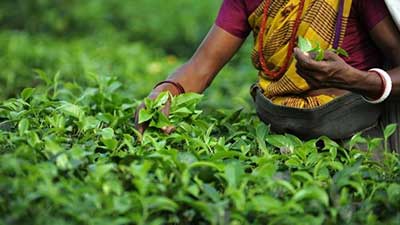Date: 26/12/2022
Relevance: GS-3: Indian Economy and issues relating to planning, mobilization, of resources, growth, development and employment.
Key Phrases: Darjeeling Tea, relief scheme, certification trade mark and GI (geographical indication), Tea Board of India, international market, source of origin, evergreen revolution, Indian Council of Agricultural Research (ICAR), National Agricultural Research System (NARS), agro-climatic zones
Why in News?
- Recently, Anupriya Patel, Union Minister of State for Commerce and Industry has said no separate relief scheme for Darjeeling Tea is under consideration at present against a query on the crisis among growers of Darjeeling Tea.
Key Highlights:
- The Rajya Sabha members wanted to know whether the Government was aware that cheaper imports of Nepal tea under the trade agreement had caused damage to high-class Darjeeling Tea, and asked if the Government is considering any relief scheme to protect Darjeeling tea from further destruction.
- The Minister said the Darjeeling Tea is protected by certification trade mark and GI (geographical indication) and has a distinct logo.
Do you know about the Tea Production in India?
- Tea plants are native to East Asia and probably originated in the borderlands of southwestern China and northern Burma.
- Tea requires well drained soil with a high amount of organic matter and pH 4.5 to 5.5.
- The performance of tea is excellent at elevations ranging from 1000 - 2500 m.
- Tea plants thrive in cooler climates with high amounts of rainfall—at least 40 inches per year.
- The nursery soil should be well drained and deep loam in nature with pH of 4.5 to 4.8.
- India is the second largest producer of tea in the world after China.
About Tea Board of India:
- Tea Board is a statutory body under the Ministry of Commerce that was set up in 1953 for the development of tea industry in India.
- Tea Board’s vision and mission is to make the country a leading producer of tea across the globe for which it established several programmes and schemes.
- Tea Board is constituted of 31 members (including Chairperson) drawn from Members of Parliament, tea producers, tea traders, tea brokers, consumers, and representatives of Governments from the principal tea producing states, and trade unions.
- The Tea Board is reconstituted every three years.
- Tea Board has its headquarters located in Kolkata and 17 other offices across India.
- The Tea Board of India has overseas offices in Moscow, Dubai, Hamburg, London, New York.
What are the actions taken by the Government to protect Darjeeling Tea?
- Recently, the Tea Board has issued instructions, directing all importers and buyers of tea to ensure that the origin of imported tea to be mentioned in all their sale invoices and not to pass off imported tea as tea of Indian origin.
- All distributors and blenders of tea have been directed that the label should clearly indicate on the packaging that the contents of the blended tea are imported and also mention the source of origin of imported tea.
- All importers should inform about the place of storage of such imported tea to the nearest Tea Board office within 24 hours of entry of such tea into India.
- The Minister said the production of Darjeeling Tea stood at 7.15 million kg during 2021-22 as against 6.74 million kg in 2020-21.
Government plans to promote evergreen revolution in Tea production:
- Roadmap for revolution in tea sector:
- Union Minister of Agriculture and Farmers Welfare, said evergreen revolution in the tea sector is the improvement in productivity in perpetuity without ecological and social harm.
- Evergreen revolution takes care of the adverse impacts of climate change, environmental pollution, soil degradation, groundwater depletion and loss of biodiversity for increasing yield.
- Objective is to produce more from less inputs:
- More crops from less water, less land, less pesticide, less fertilizer.
- The Evergreen revolution is necessary for ensuring food, nutrition and environmental security in a sustainable manner.
- Developing high-yielding and climate-resilient varieties:
- For evergreen revolution, Indian Council of Agricultural Research (ICAR) is working on development of high-yielding and climate-resilient tea varieties.
- In the last eight years, National Agricultural Research System (NARS) under the aegis of ICAR has released 2,122 high-yielding stress-tolerant crop varieties / hybrids of different field crops.
- It included 1,008 varieties of cereals (rice 496, wheat 132), 310 of oilseeds, 313 of pulses, 277 of fibre / commercial crops, 130 of forage crops, 68 of sugarcane and 16 others for different agro-climatic zones of the country.
- Strengthening the seed chain of Tea crops:
- Government said seed breeders are being produced and supplied on the requirement of the states and other seed production agencies as per seed rolling plans of the states.
- During 2017-18 to 2021-22, a total of 5,701 tonnes of breeder seed of more than 1,400 varieties of 56 crops have been produced and supplied to various public and private seed production agencies for their downstream multiplication to foundation and certified seed.
Way Forward:
- Support small growers to improve quality with sustainability, increase production to meet domestic and international demand.
- Create infrastructure to augment exports and focus on high value markets such as EU, Canada, South America & Middle East.
- Promote organic and GI tea through brand promotion and marketing.
- Enable tea farmers to become self-reliant and strengthen local supply chains.
- Focus on the importance of a risk proof ecosystem, that is, the need for sustainable solutions to make tea plantations meet the challenges of climate change
Source: The Hindu BL
Mains Question:
Q. Bring out the factors that determine tea cropping patterns in India. To what extent the government initiatives have protected Darjeeling tea production against cheap imports.? (10 marks)






















